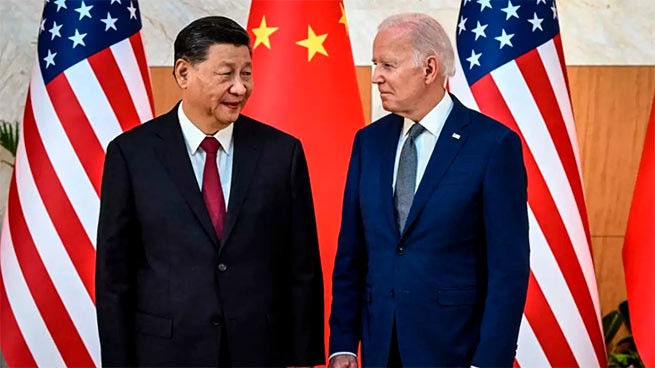The main event of yesterday and the week as a whole was the meeting of the leaders of the United States and China, Joe Biden and Xi Jinping. And the most significant moment of the meeting was when Biden called Xi a “dictator.”
The visit of the President of the People’s Republic of China to the States is truly extraordinary in these times, when Washington sleeps and sees how to organize Uyghur or Tibetan riots in China, and China gathers revolutionaries of the world order around itself.
“He is a dictator in the sense that he rules a country, a communist country, where the form of government is completely different from ours,” said the US President, thus challenging the authority of the Chinese leader and declaring his post “inferior” because he was not elected in a Western-style election.
Still, he called the talks “constructive and productive,” citing an agreement to restore high-level contacts between the militaries of the two great powers and China’s commitment to combating fentanyl.
Of course, all this was before Biden called Xi Jinping a “dictator”…
"After today, would you still refer to President Xi as a dictator?" asks a reporter.
"Look, he is. He's a dictator in the sense that he's a guy who runs a country that is a communist country that's based on a form of government totally different than ours," says Pres. Biden. pic.twitter.com/JjZeGBNcU2
— Last Call (@LastCallCNBC) November 16, 2023
What is certain is that once again the supposed “constructive negotiations” were nipped in the bud. Probably even in Beijing they did not expect that their president would be insulted immediately after his meeting with Biden.
The question here is whether this is the White House line or Biden’s personal position, because if so, then it seems that the US President is once again “not suitable for this job”as CNN recently reported.
Despite the huge US bureaucratic machine, which is capable of extinguishing many crises, Biden’s condition is becoming a factor in international politics.
First of all, it is clear that there has been no rapprochement between Beijing and Washington. Biden has already managed to call Xi Jinping a dictator, which would be extremely strange after a “successful” meeting. No, of course, the All-American Supreme Grandfather could have discharged himself after four hours of negotiations, he is not capable of such a thing, but still, negotiations of this caliber usually exclude the possibility of conversations with dead congressmen and rash words not agreed upon with anyone at all. So, as the US said, “deep tensions remain.”
Thus, the parties most likely simply identified areas of critical interests of each other. The head of the People’s Republic of China said that “China has interests that must be protected, principles that must be upheld, and red lines that cannot be crossed.”
Biden said he and Xi “agreed to pick up the phone and talk in times of disagreement.” That’s the whole result…
One thing we can say is that Biden and Xi Jinping did not agree on a single key point for them: neither on Taiwan, nor on Israel, nor on Ukraine, nor on the abolition of trade restrictions. If there were any concessions there, they were completely insignificant, which would not in any way affect the picture of relations between the two countries. And the absence of any specifics in the statements of the Chinese Foreign Ministry speaks directly to this. They didn’t even agree on artificial intelligence, the issue on which it was easiest to agree.
We would say that this meeting was most likely something of a continuation of the formalization of the divorce between China and the United States. Separately, the US said that Xi, during a conversation with Biden, promised not to attempt to take back Taiwan militarily and “clearly stated that they prefer reunification through peaceful means,” but also outlined “the conditions for the potential use of force.” Of course, China, analyzing Russia’s experience, wants to return Taiwan without unnecessary costs, but it has outlined the option of using force, which means it is already on the table.
White House about Ukraine: “The United States can guarantee that Ukraine will emerge from this war as a democratic, independent, sovereign and prosperous country that can deter and defend itself from future aggression.” There was no mention of maintaining territorial integrity in this context. In general, the cover of the magazine turned out to be prophetic: China and the United States are looking in different directions, which means that tension in Southeast Asia will grow.

PS After the completion of the negotiations, it became known that the United States announced the allocation of military assistance to Taiwan in the amount of $345 million. This, according to rumors, includes UAVs and, reliably, military training. This means only one thing – the breakdown of the negotiations was planned, just as it was no coincidence that the definition of dictator in relation to Xi came from Biden’s lips.







More Stories
Shock: Drag queen will carry the Olympic flame in Paris
Greece consistently ranks last in the EU for media freedom
Nuclear arsenals under AI control: how likely is the Terminator scenario?